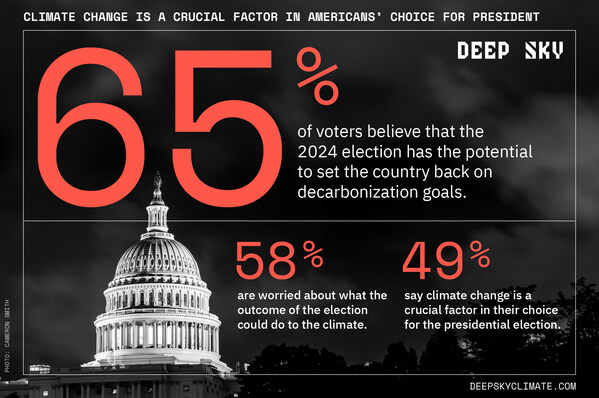65% of voters believe that the election results have a chance of setting the nation backwards on its decarbonization goals, while voters blame financial and mental health burdens on global warming
NEW YORK, July 24, 2024 /PRNewswire/ — Deep Sky, a carbon removal project developer, commissioned a public opinion survey that polled American voters on climate change. The findings show overwhelming concern about negative impact to daily life, especially as the presidential election looms.
There is a growing sense of dread among Americans who say that climate change has become a daily concern. Voters have experienced:
- a disruption to a daily routine (27%);
- property damage (24%);
- and health issues (18%).
Among voters who’ve experienced property damage, Floridians were 104% more likely to indicate this impact. Extreme weather events have become everyday concerns, with respondents ranking heat waves as the most concerning, followed by tornadoes, droughts and wildfires.
Americans are also feeling the effects of climate change on their mental health. A quarter of respondents have experienced “climate despair,” while 44% of voters say they feel that climate change is a hopeless situation. Not surprisingly, Gen Z were 21% more likely than average to indicate this. More than a quarter (26%) say that worries about the climate have negatively impacted their mental health, with Gen Z 46% more likely than average to say this.
As a result of these burdens, climate change has placed a heightened focus on the outcome of the presidential election. Among the chief concerns:
- 65% of voters believe that the 2024 election has the potential to set the country back on decarbonization goals;
- 58% are worried about what the outcome of the election could do to the climate;
- and 49% say climate change is a crucial factor in their choice for the presidential election.
What’s more, nearly 1 in 3 voters say it has impacted major life decisions for them. Of those whose major life decisions have been influenced by climate change, 55% have seen home purchases impacted (18% higher for those living in urban areas), 40% have seen retirement plans impacted (Gen X 48% more likely to say so), and 35% said it impacted their family planning (with Gen Z 51% more likely to indicate this).
Americans are also feeling the impact financially, with 28% saying that the rise in extreme weather events has caused them increased financial burdens. More than half (52%) of those experiencing increased financial burdens due to climate change say they’ve experienced increased insurance premium costs in the past 12 months.
Despite climate risk warnings since the 1970s, a lack of education persists. In the survey, 45% of respondents indicated that they do not fully understand what “decarbonization” means, with 39% not understanding how they can make a difference. Three-quarters of those who do not fully understand what decarbonization means lack knowledge about the decarbonization technology that exists.




















